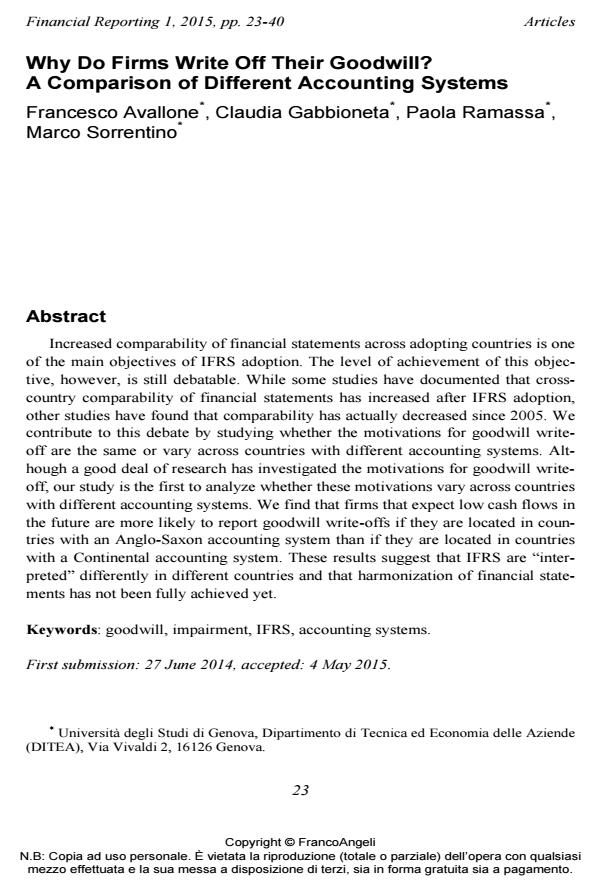Why Do Firms Write Off Their Goodwill? A Comparison of Different Accounting Systems
Journal title FINANCIAL REPORTING
Author/s Francesco Avallone, Claudia Gabbioneta, Paola Ramassa, Marco Sorrentino
Publishing Year 2015 Issue 2015/1
Language English Pages 18 P. 23-40 File size 225 KB
DOI 10.3280/FR2015-001002
DOI is like a bar code for intellectual property: to have more infomation
click here
Below, you can see the article first page
If you want to buy this article in PDF format, you can do it, following the instructions to buy download credits

FrancoAngeli is member of Publishers International Linking Association, Inc (PILA), a not-for-profit association which run the CrossRef service enabling links to and from online scholarly content.
Increased comparability of financial statements across adopting countries is one of the main objectives of IFRS adoption. The level of achievement of this objective, however, is still debatable. While some studies have documented that crosscountry comparability of financial statements has increased after IFRS adoption, other studies have found that comparability has actually decreased since 2005. We contribute to this debate by studying whether the motivations for goodwill writeoff are the same or vary across countries with different accounting systems. Although a good deal of research has investigated the motivations for goodwill writeoff, our study is the first to analyze whether these motivations vary across countries with different accounting systems. We find that firms that expect low cash flows in the future are more likely to report goodwill write-offs if they are located in countries with an Anglo-Saxon accounting system than if they are located in countries with a Continental accounting system. These results suggest that IFRS are "interpreted" differently in different countries and that harmonization of financial statements has not been fully achieved yet.
Keywords: Goodwill, impairment, IFRS, accounting systems
- National Supervision and Income Smoothing in Banks’ Annual Reports Costanza Di Fabio, pp.1 (ISBN:978-3-030-74010-8)
- Income Smoothing via Loan Loss Provision in Credit Cooperative Banks Stefano Azzali, Luca Fornaciari, Tatiana Mazza, in FINANCIAL REPORTING 2/2017 pp.33
DOI: 10.3280/FR2016-002002
Francesco Avallone, Claudia Gabbioneta, Paola Ramassa, Marco Sorrentino, Why Do Firms Write Off Their Goodwill? A Comparison of Different Accounting Systems in "FINANCIAL REPORTING" 1/2015, pp 23-40, DOI: 10.3280/FR2015-001002